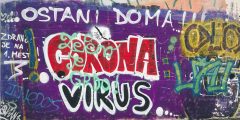Genes, trains and eureka-moments
March 8, 2024
I was in the process of writing a blog post on metaphors in genetics and genomics which was getting longer and longer and I had some personal stuff to deal with. So, I stopped. I might come back to this another time. In the process of writing, I discovered that trains have been quite an …
The language of life meets large language models
October 6, 2023
Between about 2014 and 2018 I was involved in the social and communications side of ‘synthetic biology’ as part of the Synthetic Biology Research Centre (SBRC) here at the University of Nottingham, which uses engineering biology approaches to understand and then modify industrially-relevant bacteria. I wrote my last blog post on synthetic biology in 2020. …
Gravitational waves, music and metaphors
July 7, 2023
On Thursday, June 29, 2023, the North American Nanohertz Observatory for Gravitational Waves or NANOGrav announced evidence for gravitational waves emitted by pairs of supermassive black holes across the universe or, in the words of the astrophysicist Katie Mack: “We’re using RADIATION JETS from DEAD STARS to detect RIPPLES IN SPACE from the COLLISIONS OF …
Making Science Public 2022: End of year round-up of blog posts
December 9, 2022
This is now the 10th time that I have written an overview of the blog posts I have published over the preceding year. Phew! How time flies. Strangely, this year has been quite productive. I have posted more stuff about Covid, of course, but also about monkey pox, as well as about climate change, gene …
Monkeypox and metaphors
August 19, 2022
Again and again, I have come across standard ways of metaphorically framing infectious diseases and their spread, be it foot and mouth disease, avian influenza, swine flu, SARS, Zika, Covid, and now monkeypox. War and invasion metaphors are used abundantly, but also fire, wave and flood metaphors, landscape metaphors like valleys and peaks and much …
Invasion of the covid metaphor
August 12, 2022
This post is cross-posted from the i-human Covid-19 blog (University of Sheffield). It summarises a chapter I wrote for the book Being Human during Covid-19. I’d like to thank the editors of the book for both inviting me to write the chapter and giving me the opportunity to blog about it. *** As Milan Kundera said in …
Gene drive in the press: Between responsible research and responsible communication
June 17, 2022
Gene drive is a controversial genetic engineering technique that allows scientists to modify genes so that they quickly spread through a population without following the typical rules of heredity; this can include genes that are of no benefit to the plant or animal involved. Research into gene drives has accelerated since 2015 when another new …
Covid metaphors: Three chapters and a special issue
April 22, 2022
When the pandemic began and I listened in to the chatter on the news, I started to think about the metaphors people used to talk about this devastating global event. I wrote quite a few blog posts on language, communication and metaphors. I also began various more academic activities which led to a special issue …
Gene drives and metaphors
January 21, 2022
I have been writing about developments in the biosciences for twenty years. In that time, I have covered a wide variety of topics, such as cloning, genomics, the human genome project, the microbiome project, faecal microbial transplants, synthetic biology, epigenetics, genome editing and now gene drive. I was lucky enough to get many reflections on …
Pandemics, time and learning
December 31, 2021
I was reading a thought-provoking article by Katherine J. Wu, Ed Yong and Sarah Zhang in The Atlantic, entitled “Omicron is our Past Pandemic Mistakes on Fast-Forward”. As a metaphor-collector, I loved the first paragraph – which was all about speed: “With Omicron, everything is sped up. The new variant is spreading fast and far. …
Subscribe by email
About this blog
This blog promotes discussion of topics related to the research programme 'Making Science Public: Challenges and Opportunities'. Our purpose is not to 'make science public'. Instead, we want to study the opportunities that have emerged for science to be more openly practiced and debated, but also the challenges posed by making science public or by promoting the making public of science as a solution to a variety of problems in society and in politics.
This blog will report on these and other issues related to the Leverhulme funded research programme: Making Science Public: Challenges and Opportunities
Useful links
Recent Posts
- Climate change and climate discourse: A dual disintegration
- Erving Goffman: Memories, method and metaphors
- Participation at the core: AI, ELSI and community engagement
- Understanding computational hermeneutics: Making meaning between the past and the present
- AI winter and AI bubble: Historical and metaphorical reflections
 MSP bookmarks
MSP bookmarks
- Twitter May 8, 2017
- Social innovations in Europe #RRI November 3, 2015
- Harvey Graff, the undisciplinarian September 20, 2015
- Replacing Pesticides With Genetics August 31, 2015
- Addressing hazardous chemicals in the circular economy August 25, 2015
Categories
- antibiotics
- anticipatory governance
- artifical intelligence
- big data
- biotechnology
- citizen science
- Climate Change
- Climate Politics
- co-production
- coronavirus
- Creationism
- Definition of Science
- designer babies
- disease
- disease
- engineering
- epigenetics
- Food Security
- Food sovereignty
- gene drive
- genomics
- GM Food
- GMOs
- history of science
- Hype
- images and visualisations
- imaginaries
- Immigration
- Impact
- infectious diseases
- innovation
- interdisciplinarity
- Knowledge Society
- Language
- Markets
- Metaphors
- microbiome
- neoliberalism
- Neuroscience
- open access
- Personal Reflection
- Politics
- Public education
- public engagement with science
- public needs
- public participation
- public policy
- public service
- publics
- regulatory science
- Religion
- Republican Party
- research impact
- responsible innovation
- responsive research
- Richard Dawkins
- risk
- Scepticism
- Science
- Science and Government
- science and politics
- Science and Songs
- science communication
- Science Communication
- Science Fiction
- Science Policy
- Social science
- sociology
- space
- space exploration
- synthetic biology
- transparency
- Trust
- Uncategorized
- Uncertainty
- visualisation
- wonder










